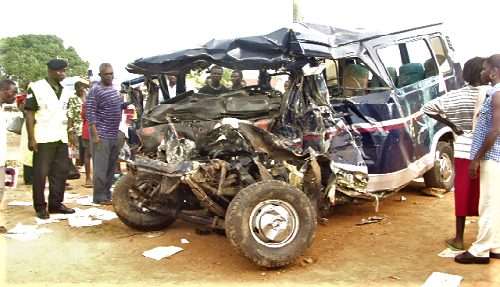
Fund-raising campaign for road accident victims launched
A campaign to solicit funds to support victims of road accidents has been launched in Accra.
Known as “I Support Accident Victims”, it is an initiative of the Accident Victims Support Ghana Foundation (AVS), a not-for-profit organisation.
The initiave offers the public, government and private institutions the opportunity to support the foundation to generate continuous revenue for the campaign.
Funds generated would be used to offer relief for road crash victims, build a monument site for crash victims that got burnt beyond recognition, and to help the foundation’s operations such as travelling across the country to see victims.
The campaign was launched by the General Overseer of the Global Revival Ministries, Rev. Robert Ampiah Kwofie.
The Founder and President of AVS, Reverend Ciril Crabble, explained that there were many victims that needed support, but the foundation was unable to cater for them all.
“I receive a lot of calls from victims, but I’m unable to help because I sometimes do not have what they are asking for. So, we are launching this to expand our scope and introduce the organisation to the entire country that we are here, and we’ve been doing this for a long time,” he said.
Rev. Crabble said money, as well as recovery aids, were not the only support some of these victims needed, but also needed to feel cared for, to be counseled, and to feel compassion.
Support
In a speech read on his behalf, the Minister of Roads and Highways, Kwasi Amoako-Attah, said the ministry continued to strategise to ensure safety and security for all categories of road users by incorporating pedestrians safety facilities in the planning, design, construction and maintenance of road infrastructure.
He stressed that road safety was a major priority of the road sector, and that the ministry was collaborating with the National Road Safety Authority (NRSA) and the Driver and Vehicle Licensing Authority to sensitise and educate drivers and road users on the safe use of road infrastructure.
Mr Amoako-Attah disclosed that about 90 per cent of the crashes in Ghana were attributable to human error due to the indiscipline of some drivers and motorcycle riders and the disrespect for road traffic laws and regulations, with vehicle and road infrastructure sharing the remaining 10 per cent.
He explained that statistics indicated that road traffic crashes killed about 2,000 persons and injured about 14,000 people annually on average, and that the most vulnerable road user groups were pedestrians who constituted about 40 per cent of fatalities.
Rules, regulations
The acting Director-General of the NRSA, David Adonteng, said many drivers were not adhering to road safety protocols.
“They sit behind the steering wheel and discard the law, sometimes overtaking wrongly and drunk-driving, ending up burdening the society,” he said.
He said drivers could help to minimise road accidents by obeying simple rules and regulations, some of which were wearing seatbelts, avoiding drink-drinking and staying off the road when tired.
He expressed disappointment that some individuals videod road accidents instead of calling for help.
“In Ghana, if you are not careful, you will bleed and die off. We have a problem that needs to be fixed,” he said.
Mr Adonteng pledged the preparedness of the government and the Ministry of Transport to support the foundation to help road accidents victims.
